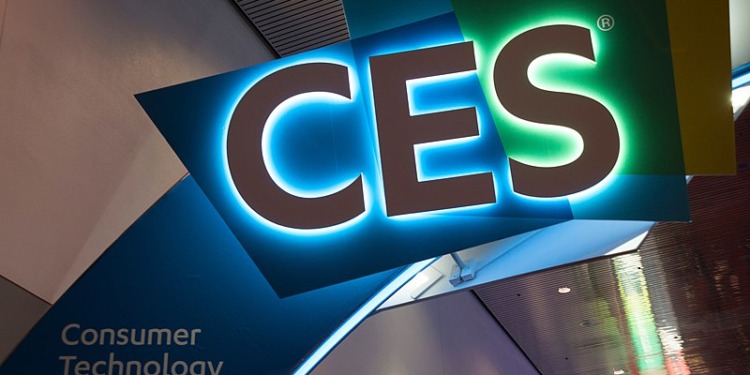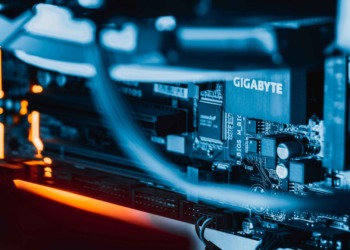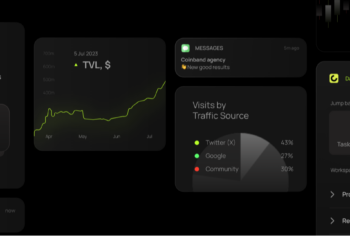CES 2023 in Las Vegas showed off technology for the pocket and countertop alike, with an emphasis on energy efficiency, sustainability, accessibility, health and wellness, and expanded use of artificial intelligence.
The Consumer Electronics Show, or CES is the least technical tech event in the world. Hosted annually in Las Vegas, it is where consumer technology companies show off products, ideas and concepts for the short- and long-term future.
With the advent of social media, the need for new companies to make a splash, and for establishment players to stay relevant often turns the show into the weird and wonderful.
This year was no exception, with the Taiwanese Acer showing off an exercise bike that doubled as a laptop charging station for your work-from-home setup. German luxury carmaker BMW presented their i Vision Dee, a car that has display panels all over it, so a user could change its colour at will, or make it look like it has a face on the front.
Best friends love to match 😍 E Ink Digitalisation, to keep your car as unique as you. #TheUltimateCompanion, The BMW i Vision Dee. #CES2023 @EInk pic.twitter.com/oPWpB8lZ1z
— BMW (@BMW) January 6, 2023
On the subject of anthropomorphised technology, robots are a mainstay of shows and expos in the tech space: From uses as specific as picking green peppers—yes, only green peppers—to the billionth generation of a robotic dog that presents itself as a learning tool for children, this one apparently specific to computing and coding.
You’ll also find your standard fare of newer versions of things you use every day: Samsung’s Display arm showed off a new technology in foldable smartphones, with a screen that slides, rolls and folds.
Samsung Display’s folding prototypes are even wilder in person. #CES2023 pic.twitter.com/cqvgSAVLfE
— Eli Blumenthal (@eliblumenthal) January 4, 2023
Alienware, Dell’s gaming division, released a quartet of laptops.
Pivoting away from their trademark bulky and superpowered devices, the new devices, launching later this year, take a slight dip in power and are much slimmer and backpack-friendly. Whether this new design language will pay off for such a recognisable line of products in the enthusiast gamer market remains to be seen.
Say hello to the new X Series Alienware laptops!
🔺 Our most premium gaming laptop, the x16
🔺 A refresh with the x14 R2Learn about all the new laptops here: https://t.co/9Xw43gBLqr pic.twitter.com/ZTYADxkrV4
— ALIENWARE (@Alienware) January 3, 2023
Tech for Accessibility
Making consumer technology available truly to every consumer involves an inclusive approach to design thinking. Accounting for disabilities is a chasm in the technology of leisure that began to be filled this year. Most notably:
- Sony: It added millions of prospective customers to the userbase of its ubiquitous PlayStation 5 by showcasing its offerings in accessibility. “Project Leonardo” is a modular controller kit that is customisable according to a user’s needs and works in every possible configuration. Gaming controllers rely on dexterity and grip, and this hasn’t changed since the start of the millennium. A household name and Original Equipment Manufacturer(OEM) like Sony focussing development in the space of disabilities to make leisure truly for everyone is important and should be lauded.
Introducing Project Leonardo for PS5, a highly customizable accessibility controller kit designed to help players with disabilities play more easily, more comfortably, and for longer periods.
More info: https://t.co/qqCfpnPJr6 pic.twitter.com/IM0iulP0Fk
— PlayStation (@PlayStation) January 5, 2023
- Samsung: It was another OEM that made strides in the accessibility space, launching something called Relumino Mode. This is an accessibility setting that draws object outlines, sharpens contrasts and sharpens images on a display in order for those with visual impairment to be able to best receive the on-screen content. This is a technology that will be embedded within 4k and 8k display Samsung TVs released later this year.
Introducing Relumino Mode, which makes content viewing possible for those with low vision. It highlights outlines and improves contrast and color, making content clearer and easier to enjoy. Here’s to caring for all. #CES2023 #Samsung #CESInnovationAwards pic.twitter.com/UrUeE80X3U
— Samsung TV (@SamsungTV) January 5, 2023
Health and Wellness Tech
In this area there were several notable innovations, among them:
- Smartwatches: With the Apple Watch Ultra’s recent release, technology towards health and wellness had a lot to live up to.
- The NoWatch did this by seeing Apple’s technology of extreme capabilities and realising, perhaps accurately, that for some consumers, smart wearables were featured to an overwhelming extent. The NoWatch isn’t even a watch: It has no dial or display. It does not notify you of texts or calls. It tracks your heartbeat and your steps, and very little else. This information is aggregated and presented to you only when you want, through the appropriately minimalist smartphone app.
What if a smart watch was beautiful and didn’t need to tell the time? That’s what Nowatch does. It has interchangeable stone faceplates, with a smart sensor underneath tracking all the health data we’ve come to expect. And a mindfulness button to log key events #CES2023 pic.twitter.com/g3rSoxfQq6
— Greg Swan (@gregswan) January 6, 2023
- Establishment mid-teir watchmaker Citizen, however, took an altogether different approach by bringing an unprecedented featureset. The CZ watch measures levels of fatigue and alertness, all but unheard of in currently available smartwatches The CZ watch is also reportedly capable of taking this information and telling you whether you’re biologically a morning or night person, or your chronotype, to use the neurological term.
Introducing the new CZ Smart watch—Sport Collection. CZ Smart YouQ leverages @NASA scientific research and AI models built with @IBM Watson® Studio and is designed to offer radically personalized actions to optimize wearer wellness. #CZSmartYouQ #CES2023 https://t.co/z2x2QbAK5c pic.twitter.com/lK2JFYTgyd
— Citizen Watch US (@CitizenWatchUS) January 5, 2023
- The NoWatch did this by seeing Apple’s technology of extreme capabilities and realising, perhaps accurately, that for some consumers, smart wearables were featured to an overwhelming extent. The NoWatch isn’t even a watch: It has no dial or display. It does not notify you of texts or calls. It tracks your heartbeat and your steps, and very little else. This information is aggregated and presented to you only when you want, through the appropriately minimalist smartphone app.
- Diagnostics
- Withings: A health tech company, famous for its smart weighing scales, it has just released the urine scanning tool called…the U-Scan. While it might not win any awards for innovative naming, it does bring a novel angle to the health scanning tech available to a new-age home. The U-Scan attaches to any already existing toilet and scans the urine that enters the said toilet. It discerns between toilet water and urine while flushing and is even capable of collecting information on multiple users by noting the differences in “streams”, to put it delicately. With a general diagnostics device and a menstrual cycle tracking device available, the company says more specific features are in the works. For individuals with any of a host of conditions that might require urine tracking, this makes urine testing, a previously clinical activity, a passive and accessible activity.
At #CES2023, health tracking gets a little more intimate with in-toilet sensors that may tell you if you're low in nutrients, whether you're about to ovulate and more.https://t.co/oCTi26GAxq
— CNET (@CNET) January 4, 2023
- Withings: A health tech company, famous for its smart weighing scales, it has just released the urine scanning tool called…the U-Scan. While it might not win any awards for innovative naming, it does bring a novel angle to the health scanning tech available to a new-age home. The U-Scan attaches to any already existing toilet and scans the urine that enters the said toilet. It discerns between toilet water and urine while flushing and is even capable of collecting information on multiple users by noting the differences in “streams”, to put it delicately. With a general diagnostics device and a menstrual cycle tracking device available, the company says more specific features are in the works. For individuals with any of a host of conditions that might require urine tracking, this makes urine testing, a previously clinical activity, a passive and accessible activity.
-
- Nuralogix: In the health diagnostics space, this is a newer figure; the startup presented a smartphone app that takes a 30-second selfie and can present information about blood pressure, blood sugar, skin age and stress.
[Press Release] NuraLogix Announces ‘Holy Grail’ of Blood Pressure Measurement
Read the full story here: https://t.co/pSHXgXT0kq pic.twitter.com/qXtsiO7kQC
— NuraLogix (@nuralogix) January 4, 2023
- Nuralogix: In the health diagnostics space, this is a newer figure; the startup presented a smartphone app that takes a 30-second selfie and can present information about blood pressure, blood sugar, skin age and stress.
This contactless approach to diagnostics, especially one house within your pocket has serious promise and will make regular checking universally possible, leading to a healthier populace.
Sustainability Tech
On the sustainability front (we’ve written a full article on CES 2023 sustainability), many angles of attack, active and passive, were shown:
- Sony and Honda: They showed off their electric car project “Afeela”, to much fanfare. It must be said that Sony has promised smart electric mobility before, which has yet to materialise in any tangible way. This is presumably why they partnered with Honda, themselves fresh from making hybrid engines that won a Formula 1 championship. They have given a release date of 2026.
Related articles: PikaBoost: Accessible Electric Bikes | ChatGPT Is Becoming As Smart As Humans | Levante Makes Foldable Solar Panels
Carmakers participating in CES, like Honda, and the aforementioned BMW, is unquestionably a good sign. This normalises the idea of a battery-powered car, and the rapid innovation of consumer technology supercharges the crawling evolution of the automobile industry. Partnerships like this are positive and will be watched closely.
- Samsung: It made quite a splash this year, showing off a myriad of products, many in the household appliance area.
- They presented a filtering system for their washing machine range that filtered the wastewater produced in a washing cycle for microplastics.Detergents and mass-produced clothing are major contributors to microplastics and until these products are made sustainably en masse, systems like these will go a long way to minimising ocean and freshwater pollution.
From fun repurposed packaging, to washers that remove microplastics, to solar-powered remotes. That’s a wrap from #CES2023 Day 2! See you tomorrow 👋 pic.twitter.com/ENdIVOUkyW
— Samsung US (@SamsungUS) January 7, 2023
-
-
- Most notably, however, Samsung also released its SmartThings Station. This is a home automation hub that can communicate with your rapidly-expanding smart home ensemble and allows you to program “scenes” or sequences of device actions across devices when triggered by a condition(like someone entering a room) or occurring at a given time. This has obvious energy-saving benefits that were made even more significant with the integration of Matter.
-
Samsung Unveils SmartThings Station at CES 2023, Making Smarter Homes Accessible for Everyonehttps://t.co/0jwuhQ9Y2O
— Samsung Electronics (@Samsung) January 4, 2023
- Matter: The aim here is to provide compatibility across the home automation sector, and it’s a goal that appeared for the first time at CES this year. Matter is essentially a compatibility standard for smart home devices that supersedes device type, make or model. This means that the manufacturer of a device or its software doesn’t restrict the kind of devices that it can be linked to, as it has so far. You may be familiar with the idea of home appliance “ecosystems”-Think of Apple home hub, which only supports apple’s airplay and will only work with apple’s Apple TVs, iPhones etc. Matter seeks to eliminate this restriction, as being committed to any one family of devices makes smart homes cost-prohibitive and inaccessible. With open-source, hardware-agnostic standards like Matter, people across budgets can invest in smart lights, thermostats, blinds etc and can remain unconcerned about cross-compatibility. This means that automating energy-conservative heating, lighting and electric solutions is now more affordable and accessible, and will aid many hit by the ongoing cost-of-living crisis.
Smart home tech new device announcements at @CES highlight support for #Matter that brings compatibility with @amazon #Alexa, @Apple HomeKit, @Google Home, and @Samsung @SmartThings. @CNEThttps://t.co/DIdW2m4if1 #csaiot #buildwithmatter #standardsmatter #globaltech #CES2023 pic.twitter.com/UUeIMegFEj
— Connectivity Standards Alliance (@csaiot) January 7, 2023
- Bosch and GE: Also seen presenting appliances and innovations in the smart home space were Bosch and GE. As industry outsiders, not particularly known for their sustainable practices (seeing as GE is an energy company) this is promising and will hopefully see more large energy-guzzling corporations make efforts in efficiency and sustainability.
Energy Efficiency in Computing
Energy efficiency was the name of the computer game this year – accelerated not only by heightened concerns for sustainability but also the Ukraine war and energy price spikes.
The carbon cost of data centres and server farms has been covered exhaustively. The cost of processing and then cooling the chips that do that processing is high, and solutions have been few and far between. That has changed or at least begun to.
- AMD: Most visibly, CPU and GPU monarch, AMD launched their data centre Accelerated Processing Unit(APU) at a media event. Having been described as “game changing”, this industry-first combines the functions of RAM, CPUs and Graphics cards in one design. It does this by being composed of “stacks” of “chiplets”(circuits that are smart, but not as smart as chips). The Instinct MI300 is comprised of 13 stacked chiplets, stacked 3-dimensionally, and totalling 146 billion transistors, the largest AMD has manufactured. The APU is reported to have accelerated AI and Machine learning algorithms to a fraction of the time, thus reducing the energy cost per unit time of training these technologies.
My favorite quote: "This is the future of supercomputing."
"At CES 2023, AMD disclosed more details on its new supercomputing product, the AMD Instinct MI300. It did a bit more than that, actually showing off the chip on stage a…https://t.co/lhWkIv9gbJ https://t.co/jVngCQzIRx
— Robert Hormuth (@rhormuth) January 5, 2023
- Gigabyte: Computer manufacturer Gigabyte made a powerful case for its server business this year: They presented next-gen cooling solutions, placing emphasis on their immersion cooling solutions, which are far more efficient than even the most-efficient active air-cooling solutions, and involve much less thermal output.They also showed off data centre hardware that was Ai and “high-density computing” focussed, taking the energy consumption of these increasingly utilised technologies much lower.
Three new @AMD #EPYC 9004 servers launch.
8 (Gen5) x GPU system: G493-ZB0
1U and 2U dual socket racks: R283-Z96 and R183-Z95
GPU: https://t.co/ifnLPaB8ol
2U NVMe: https://t.co/GdnB7oX3SQ
1U EDSFF: https://t.co/uBvcIQjXuc#datacenter #GIGABYTE #performance pic.twitter.com/YBb9kI18Hp— GIGABYTE Server (@GIGABYTEServer) January 4, 2023
- Qualcomm: Also present were chip manufacturer Qualcomm who said that their smart mobility business had crossed the $30 Billion mark.
Creating safer, more sustainable roadways benefits everyone. That’s why we’re collaborating with industry leaders to leverage technologies like the @Snapdragon Auto Connectivity Platform and #CV2X to improve road safety. #CES2023 https://t.co/q8zgoFKDgE
— Qualcomm (@Qualcomm) January 6, 2023
Gigabyte was also eager to show off their foray into the AI automobile space. Both firms were more involved in enabling automobile manufacturers and integrating their chipsets and technologies into road-bound vehicles than creating their own.
This will greatly reduce in-house development costs for the auto industry, not to mention streamline development, considering the comparative expertise of Gigabyte and Snapdragon in creating computing components as opposed to EV manufacturers.
The Takeaway: It’s Looking Good!
In the flawed and unequal system of capitalism, from the haze of corporate greed emerges a rare beacon of hope: Innovation. CES shows why the competitive environment of the world economy might result in life being more equitable and sustainable for everyone.
Arguably, some technology might rely on the ‘trickle down’ ideology of Reaganism, which is rightly opposed by many observers and experts. However, the IT age does embody this ideology (look at the smartphone market over time!) and heavily embodies the economics of scale. These things, if not immediately, will be increasingly accessible.
Editor’s Note: The opinions expressed here by the authors are their own, not those of Impakter.com — In the Featured Photo: CES Tech Presentations. Featured Photo Credit: Greg Bulla/WikiMedia Commons










